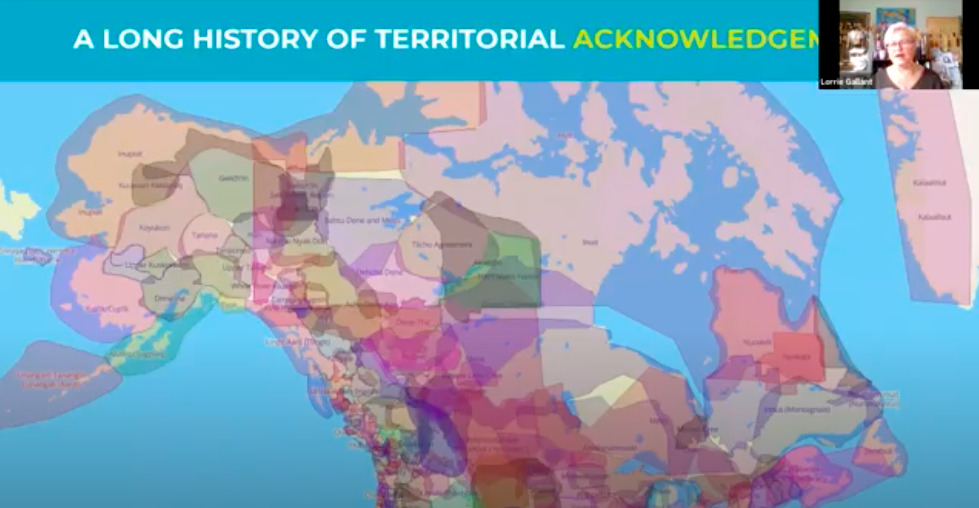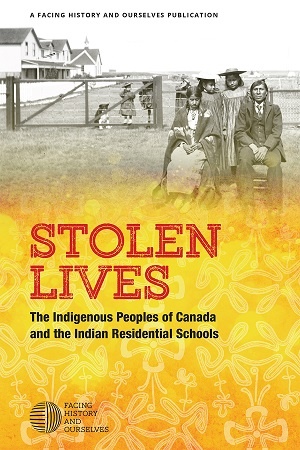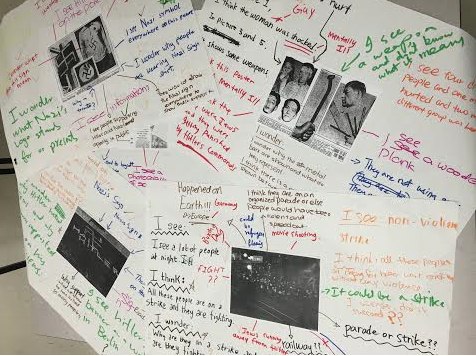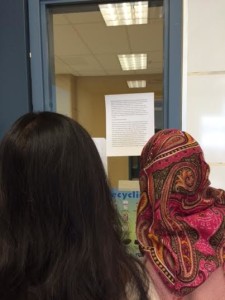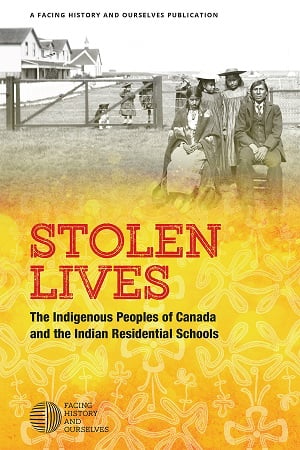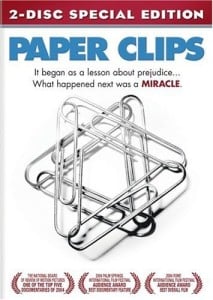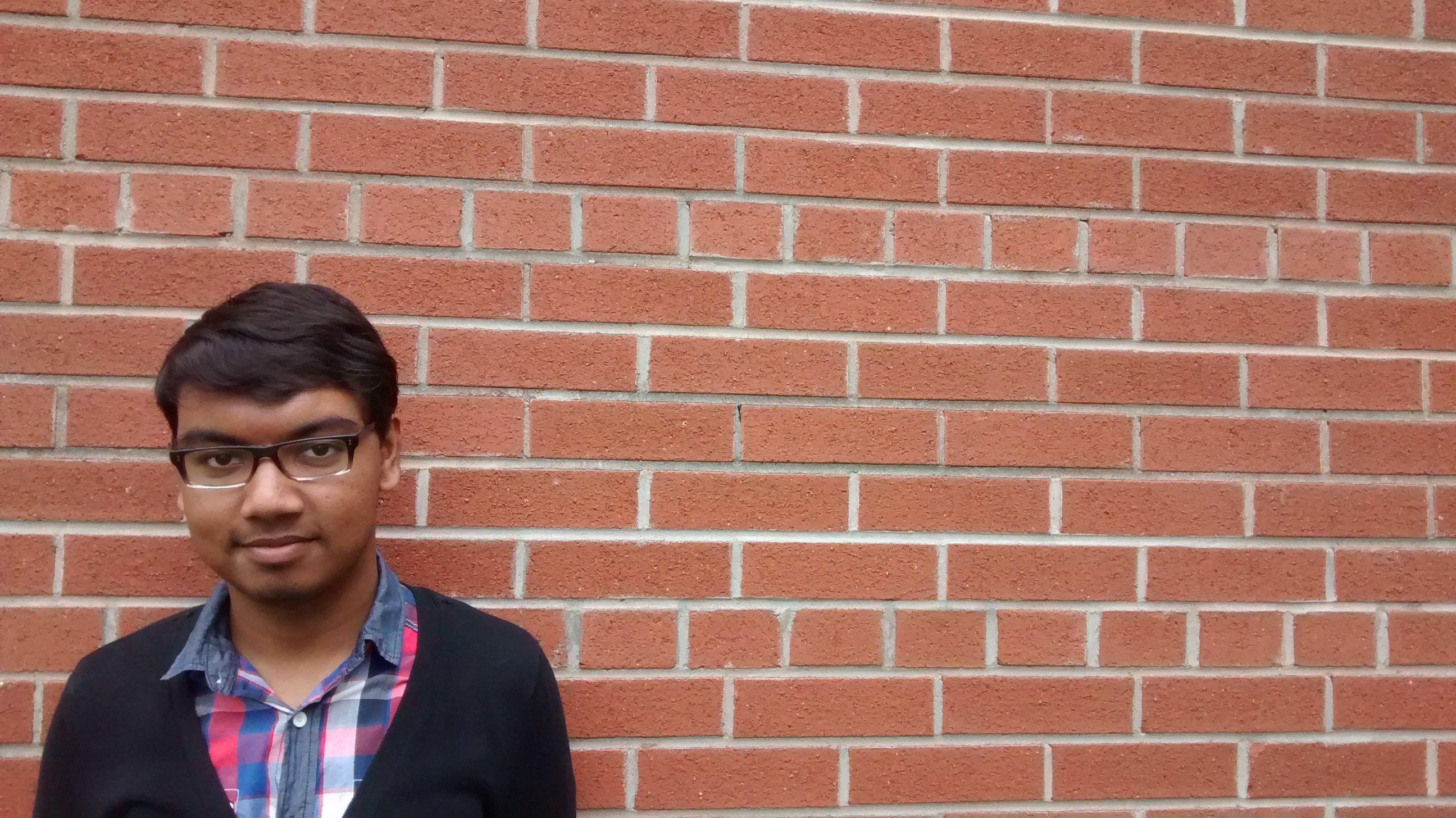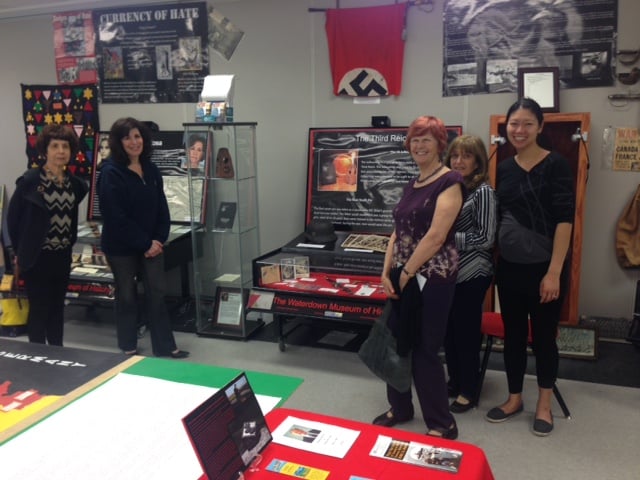This video is the first part in a four part webinar series featuring Jasmine Wong in conversation with Lorrie Gallant.
This series of blog posts explores stories and teachings that Lorrie Gallant shares about the purpose and importance of territorial acknowledgments and treaties. They are based on a recorded webinar from March 18 2020. Lorrie is a writer, illustrator, storyteller, visual artist, educator, Expressive Arts Practitioner, born and raised on Six Nations of the Grand River Territory in Ontario.
These posts and activities have been written for students to explore as part of a virtual learning community.
Read More
Topics:
Identity,
History,
Canadian History,
Indigenous History,
Indigenous,
Grade 10 History,
stolen lives,
Facing Canada,
land acknowledgements,
territorial acknowledgement
As part of Facing History and Ourselves three day summer seminar "CHC2 Canadian History through a Facing History Lens", Nathan Tidridge came to speak about "Creating a Culture of Caring Through Reconciliation as Non-Indigenous Teacher."
Nathan Tidridge teaches at Waterdown District High School and was awarded the Premier’s Award for Teaching Excellence (Teacher of the Year) and the Charles Baillie Award for Excellence in Secondary School Teaching by Queen's University. The author of four books exploring the Crown in Canada, Tidridge's latest work (The Queen at the Council Fire: The Treaty of Niagara, Reconciliation and the Dignified Crown in Canada) was launched by the Canadian Museum for Human Rights. Over the years Tidridge has spoken to numerous groups across the country, including recently the Manitoba Council of Elders, and The Crown in the 21st Century conference held in Victoria. In 2015 he was proud to be appointed to both the Ontario Heritage Trust Board of Directors and the National Advisory Council of the Prince's Charities Canada.
If you were unable to attend and would like to see the talk it was streamed and can be accessed on Periscope.
Following the event I had a chance to catch up with Nathan and talk to him a little bit about his experiences teaching difficult content in the highschool classroom. Whether or not you were able to attend this great talk, take a look at the following interview and consider the following:
1. How could you use the information in this interview to better your own teaching practice?
2. How might this interview help you contextualize the importance of addressing the TRC calls to action for your department and school?
3. How could the interview be used to help inspire and build confidence in educators to incorporate Indigenous Studies into their classrooms?
Read More
Topics:
Teaching,
History,
Canada,
Indigenous,
CHG,
CHC
Throughout my years of teaching I began to realize something that Facing History and Ourselves so adeptly addresses- that we tend to see ourselves as “us” vs. “them.” I think that’s one of the hardest issues I’ve come across in teaching WWII, as so many students see what happened as a problem solely with Germany. “They” were racist. That could never happen “here!” It’s “their” problem. But what I really wanted to address in my classroom is that the roots of anti-Semitism and racism that led to the Holocaust were not just found in Germany!
Read More
Topics:
Antisemitism,
Choosing to Participate,
History,
Canada,
Canadian History,
genocide,
big paper
May is Asian Heritage Month in Canada. The following are five resources that provide entry points that teachers can use to invite students to explore Canada’s history of immigration through identity and civic participation.
Read More
Topics:
Books,
Film,
History,
Canada,
Canadian History,
Culturally Responsive and Relevant Pedagogy,
CHG
Bringing Indigenous Voices into the Classroom
In December of 2012, I visited the Woodland Cultural Centre and former Mohawk Institute in Brantford, Ontario for the first time. This visit had a lasting impact upon my understanding of the residential school system in Canada. Subsequently I asked myself, how could I further embed Indigenous history into my courses?
Read More
Topics:
Choosing to Participate,
Facing History Resources,
History,
Canada,
Media Skills,
Technology,
Truth and Reconciliation,
current events,
Culturally Responsive and Relevant Pedagogy,
Indigenous,
Lesson Ideas,
In the news,
Social Justice
The truth needs to be told. The truth needs to be taught.
-Anonymous student
This year has brought a lot of change to my classroom - for one, it’s in a new school! I started the year at Central Toronto Academy (CTA) in downtown Toronto. It has been a fantastic experience working with the staff and getting to know a whole new group of students. I was particularly excited to bring Facing History and Ourselves into a new school and see how it was picked up by students unfamiliar with the organization and it's pedagogy.
Read More
Topics:
Choosing to Participate,
Human Rights,
History,
Canada,
EdTech,
Technology,
Truth and Reconciliation,
Indigenous History,
current events,
Indigenous,
In the news,
Social Justice,
reflection
As a middle school educator, I often find myself in the position of being unable to explore really rich resources with my class due to mature content. Several years ago I purchased 5 sets of the graphic novel MAUS, hoping to one day use it as an option for book talks.
Read More
Topics:
Books,
Antisemitism,
Choosing to Participate,
Facing History Resources,
Holocaust,
History,
Canada,
Holocaust Education,
current events,
Middle School,
genocide,
Lesson Ideas,
Holocaust and Human Behaviour
On November 26, we released Stolen Lives: The Indigenous Peoples of Canada and the Indian Residential Schools. This new resource brings educators new primary sources and first-person accounts about a painful period in Canadian history, when about 150,000 Indigenous children were forcibly taken from their families and stripped of their language, culture, and traditions.
Read More
Topics:
Human Rights,
Facing History Resources,
Identity,
Facing History and Ourselves,
History,
Canada,
Racism,
current events,
We and They,
Culturally Responsive and Relevant Pedagogy,
genocide,
legacy,
In the news,
English Classroom,
Social Justice
As an educator I often wonder what students remember once they have left my classroom. It is my hope that when they leave they take with them critical thinking skills, the ability to engage in difficult conversations, and a deeper understanding of how we are all connected - in the past, present, and future. Through all of my various attempts to learn from my students what they are getting out of their Facing History and Ourselves class, I have found that the best way to find out what students are learning is to ask them.
Each year, at the end of our grade 11 elective Facing History and Ourselves course, Genocide and Crimes Against Humanity, we take the time to reflect on our learning and ourselves. This year a group of students from my classroom chose to participate in a reflective interview process in lieu of their final journal entry assignment, and agreed to share their reflections.
Below, as inspired by the popular blog Humans of New York and the Facing History project, Humans of the Woodlands, you'll have the chance to glimpse into the classroom learning and life of a few of my Facing History and Ourselves students.
Read More
Topics:
Choosing to Participate,
Identity,
History,
Holocaust Education,
Memorial,
We and They,
Culturally Responsive and Relevant Pedagogy,
legacy,
Genocide and Crimes Against Humanities Course,
Holocaust and Human Behaviour,
Inside a Genocide Classroom,
Social Justice,
Personal history,
reflection
In 2013, Waterdown District High School teacher Robert Flosman applied for and won a Margot Stern Strom Innovation Grant to create a Museum of History in his classroom as a way to engage students deeply and differently in the study of history. In November 2014, he wrote a post for this blog describing his museum. One year later, Rob has more to tell us about the museum Facing History and Ourselves’ grant made possible.
Read More
Topics:
History,
Canada,
Innovative Classrooms,
Museum Studies,
Margot Stern Strom Innovation Grants,
Memorial,
Genocide and Crimes Against Humanities Course

